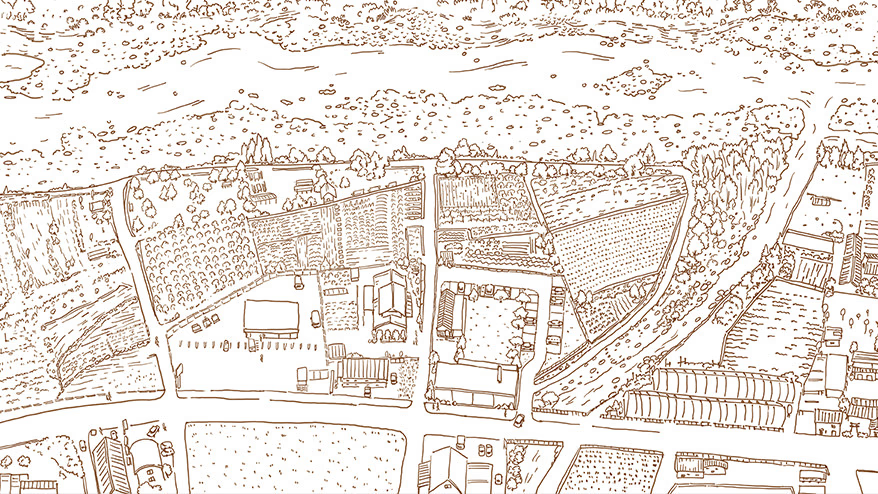I'm Manabe, head of the production department.
On April 1, 2016, Food Hub Project Inc. was established. It is a new company jointly launched by the Kamiyama Town Hall in Tokushima Prefecture, the Kamiyama Tsunagu Corporation, a general incorporated association that was established at the same time, and Monosus. I have been working as the COO since the beginning.
As mentioned in a previous article , the Food Hub Project was born out of the activities of the Kamiyama Town Hall's Regional Revitalization Strategy Working Group. Now, with this project now taking shape as a new company, we would like to share with you in detail what its purpose is and what it is aiming to achieve.
[Objective of the activity]
Locally produced food | We aim to Farm Local, Eat Local.
The Food Hub Project's motto is "Farm Local, Eat Local." By cooking and eating locally grown food locally, the project aims to foster relationships within the community and pass on Kamiyama's agriculture and food culture to the next generation.
As of 2016, the average age of farmers in Kamiyama Town is over 70 years old. As a result, the increase in abandoned farmland is a major issue for the town. The Food Hub Project aims to preserve farmland by accepting and nurturing people who want to start farming, and to discover the agricultural style of the future in mountainous areas.
To achieve these goals, we are making preparations with the activity theme of "Grow, Gather, Eat, Connect."
[Activity Details]
Grow, gather, eat, connect.
The Food Hub Project will carry out its activities based on four food-related activity themes.
- Cultivating: A unique agricultural challenge in mountainous areas
- Gathering ~Running a local food alliance (CSA) to foster relationships~
- Eat ~ Operating a local kitchen (diner, grocery store, bakery) ~
- Connecting: Implementing food education programs in collaboration with local community groups and schools
1. Cultivating: A unique agricultural challenge in mountainous areas
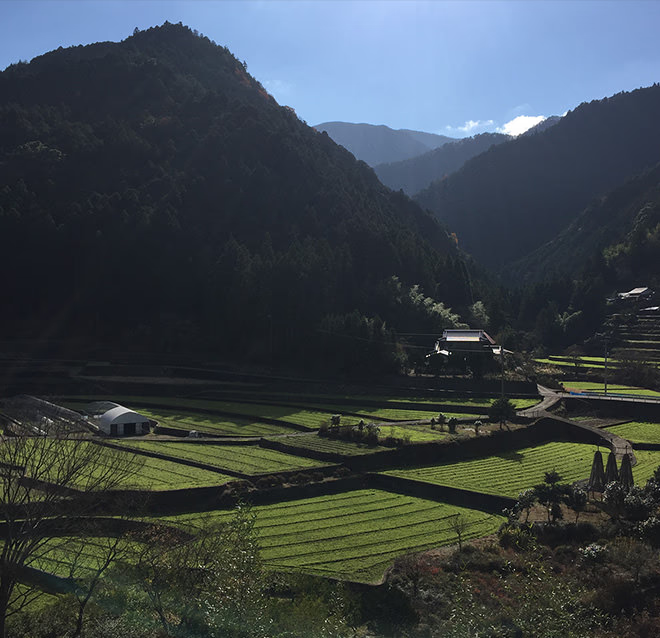
In order to prevent further increases in abandoned farmland, it is necessary to welcome the next generation of farmers into the town and at the same time train them. The Food Hub Project is an organization that serves as an intermediate between the public and private sectors. It operates its own farm, mainly producing Kamiyama rice and glutinous rice, while also renting farmland that has become unmanageable due to aging, and managing and operating this farmland by accepting and training new farmers.
In mountainous areas, it is difficult to bring large machinery into farmland, and traditional farming methods have their limitations, so we will work with multiple small-scale agricultural groups to create a system that will enable the production of a wide variety of products in small quantities within the region. We have just begun discussions to find a form of agriculture unique to mountainous areas.
- Accepting and training new farmers
- Farm management and coordination
- Nurturing agricultural workers
- Managing our own farm
- Collaboration with small-scale agricultural groups
- Realizing organic and specialty cultivation of small quantities of a wide variety of products through regional cooperation
2. Gathering: Managing a local food alliance (CSA) to foster relationships

CSA (Community Supported Agriculture) is a system where consumers support agriculture by purchasing directly from farmers on a regular basis, paying in advance. It has become popular in the United States and other countries in recent years, but is said to have originated from Japan's "Producer-Consumer Partnership." (Recently, " Taberu Tsushin " and other websites have been developed based on this idea.)
Originally, CSA was a system where "community = local people" supported agriculture together, but nowadays, the daily connection between farmers and consumers has weakened, so it feels like a bunch of highly motivated individuals are supporting "farmers' income." This makes it difficult to develop the awareness and relationships that fundamentally support "local agriculture."
Therefore, the Food Hub Project will limit its activities to the small area of Kamiyama, making the relationships easier to see and creating an environment in which small-scale farming groups currently active in the area can continue to operate more easily. In addition, by cultivating daily connections with people who eat the food (consumers), we hope to create a system of regular sales that supports local agriculture through consumption.
- Operation of local food partnership service
- Recruiting food and beverage affiliate members and running the membership organization
- Building and operating a distribution system that circulates within the region
- Collaboration with small-scale agricultural groups
- Purchase and sale of organic and specially grown vegetables from Kamiyama
- Collaboration with organic farming groups in Tokushima Prefecture
3. Eat - Operating local kitchens (diners, grocery stores, bakeries)
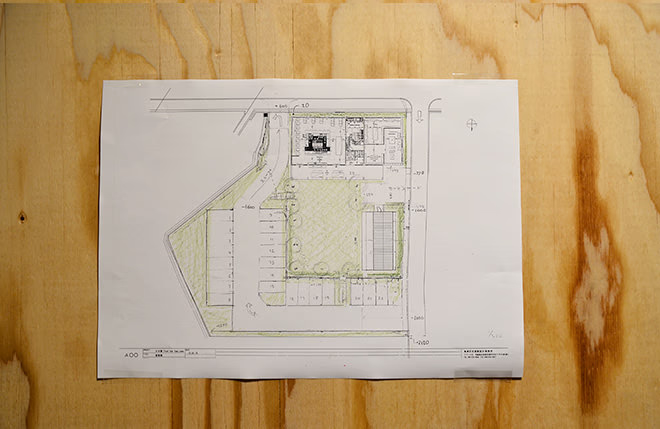
Site exterior concept sketch
When you say "kamaya" in Kamiyama, everyone starts talking, "That brings back memories. Back in the old days..." Apparently, until the generation now in their late 30s was a child, their homes had a dirt floor with a hearth for cooking rice with firewood, and that place was called "kamaya."
"Kamaya" is a place filled with various memories for the people of Kamiyama. The Food Hub Project will create a restaurant called "Kamaya Kamiyama" and serve meals in buffet style using plenty of local ingredients. In the hearth located in the center of the restaurant, delicious rice grown in Kamiyama's clean mountain water will be cooked, and the restaurant will operate in a way that local people can come and eat every day.
There will also be a shop called "Kamapan & Store" selling groceries and bread. The shop will have a theme of "Enjoying Kamiyama's Dining Tables," and will sell organic and specially grown vegetables, as well as seasonings that are actually used in the cafeteria, such as miso and soy sauce that are carefully crafted over time and effort, from Tokushima Prefecture to Shikoku. Naturally yeasted bread, sandwiches, baked goods, and more will also be sold, and seasonal ingredients will be used to make local dining tables more enjoyable.
- Operation of "Kamaya Kamiyama"
- Breakfast: Self-service coffee and bread
- Lunch: Buffet-style dining hall using seasonal ingredients
- Dinner: Obanzai-style set meal or Izakaya-style restaurant
- Operation of "Kamapan & Store"
- Sale of seasonings and ingredients used daily in the cafeteria
- Sales of cooking utensils and other items that make cooking at the dinner table more enjoyable
- Selling bread and baked goods baked daily with natural yeast
4. Connecting: Implementing food education programs in collaboration with local community groups and schools
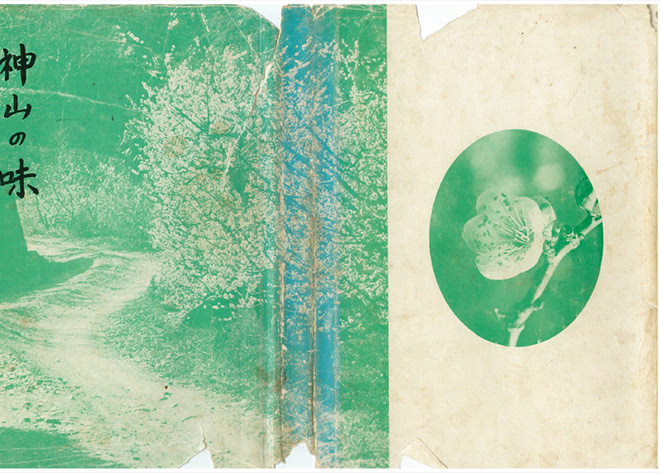
Currently, only the old book of local cuisine, "The Tastes of Kamiyama," remains.
Just as there are people in every region who are working to preserve local cuisine, Kamiyama also has a community group that is carrying on the local food culture, and there is even a wonderful book of local cuisine called "The Tastes of Kamiyama." By utilizing these assets and working together with the people who are carrying on the local food culture, we will find ways to make full use of the agricultural products that have been painstakingly grown in the region.
In addition, the branch school of Josai High School, the only high school in Kamiyama Town, specializes in agriculture and landscaping, and is located adjacent to the planned site of Kamaya Kamiyama. It is very important for Kamiyama to revitalize high schools and maintain the local population and infrastructure such as buses. Therefore, the Food Hub Project will start experimental efforts in cooperation with students of the Josai High School branch school, such as trying to grow value-added vegetables for chefs and developing processed products unique to Kamiyama in collaboration with local lifestyle groups.
Furthermore, the common kitchen attached to "Kamaya Kamiyama" is scheduled to manufacture processed foods and hold cooking classes. We would like to utilize it in various ways, such as having chefs active in various regions stay in Kamiyama and hold cooking classes for local residents and elementary school students, and collaborating with Josai High School to hold classes on growing, cooking, and eating agricultural products.
- Collaboration with local community groups
- Development and manufacturing of processed products using local specialties
- Holding cooking classes to pass on local cuisine to the next generation
- Implementing food education programs in collaboration with Josai High School Branch, nursery schools, elementary and junior high schools
- Experimental farming practices for chefs
- Developing and implementing a vegetable garden program on the food hub grounds
- Providing food education experiences through rice planting, harvesting, cooking, etc.
[Base of activities]
Food Hub Test Kitchen.
Cook, taste, gather, and learn. Let's start with food exchange!
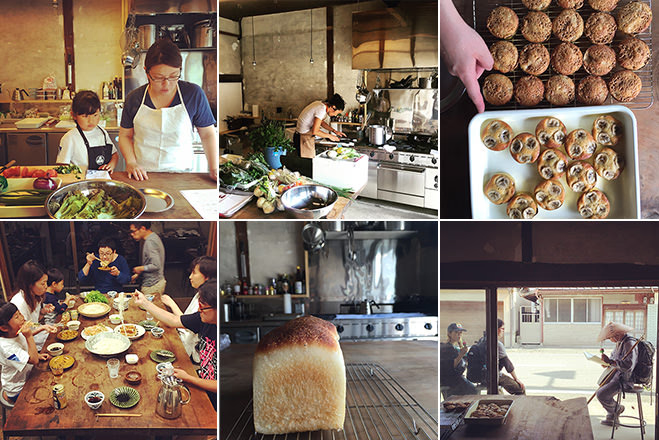
"Kamaya Kamiyama" and "Kamapan & Store" are scheduled to open at the end of 2016. Until then, we have created a " Food Hub Test Kitchen " in the earthen floor of our house as a base of operations.
In this kitchen, we plan to report on the progress of the project, hold food trial and tasting events in preparation for the grand opening, and hold cooking classes for local people. We also hope to create an opportunity to deepen our relationships with local farmers over meals.
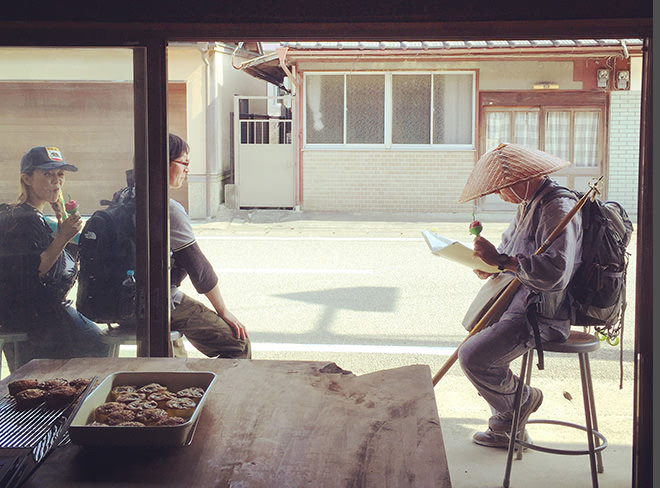
Just the other day, a pilgrim stopped by looking for a place to buy ice cream. (The monk on the right is on his seventh visit to all 88 temples!) I happened to have some leftover strawberries and some popsicles made with homemade kumquat syrup, so I gave them to him lol. Eating is fun. (We need to make and sell ice cream at Food Hub too...)
We hope you will support Food Hub Project Inc. as it takes a new step forward!
(We will also be posting updates on our activities on our Facebook page , so please follow us there too!)
